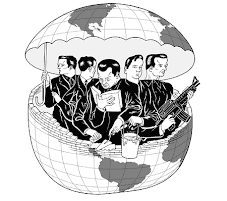
By Aarthi Sivaraman
NEW YORK (Reuters) - Who's next? Hours after the U.S. Federal Reserve threw an $85 billion lifeline to American International Group Inc, Wall Street workers took little comfort from the massive rescue and instead tried to guess who would get swept away next.
Even staff at Goldman Sachs Group Inc, among the few investment banks largely unscathed by the credit crisis, signaled fear as the firm's stock plunged.
"We're all in this together," said one Goldman employee who has been with the firm for six years and currently works in its asset management unit. She declined to give her name.
"We are still concerned since we work on Wall Street. We are not secure. Nobody is secure."
Such worries had already gripped investors, who slaughtered the shares of Goldman Sachs and Morgan Stanley, who are seen as the next possible victims of a financial industry crisis after AIG was bailed out and Lehman Brothers Holdings Inc filed for bankruptcy protection.
Goldman, which made billions of dollars last year with a timely bet the housing crisis was going to worsen, fell as much as 26 percent. Morgan Stanley took a 42 percent hit.
Instead of quelling concerns, the AIG rescue seemed to have ignited fears that more bad news is to come.
At stake for tens of thousands of Wall Street employees are highly-paying jobs that help prop up New York City and the wider U.S. economy, as well as billions of dollars in personal stock wealth and bonuses that may be erased.
Across from AIG's office near Wall Street, Deutsche Bank AG employees were also fearful of a financial tsunami.
"I have not read much about us in the papers, but that makes me nervous," said one Deutsche staffer, who said she had just returned from vacation.
"I only heard all these things about AIG from last week," she added, pointing out how the global insurance giant's status seemed to have evaporated overnight.
Still, some Deutsche employees said the firm may not be in the direct line of fire.
"We are solid. We don't fool around with mortgages and double mortgages," said Juan, a Deutsche Bank employee for 14 years, who said he knew people at AIG. He declined to give his last name.
WHY AIG?
The consensus among many Wall Street workers was that the Fed was right in jumping to AIG's rescue.
"It's a good thing," said Deutsche Bank's Juan. "Otherwise they would have gone down too, like Lehman. Forty thousand jobs is too many to lose. Let's hope this is right."
The AIG bailout came just days after the Fed refused to help a struggling Lehman Brothers. Cornered, Lehman filed for bankruptcy earlier this week.
"You cannot compare the two, given our breadth of products, size of the company and how far-reaching we are," said one AIG employee in its insurance unit. "They did what was in the best interest of the economy, the best interest of the people and the best interest of the marketplace."
But some staffers were confused as to what the rescue meant for them.
"I don't know what to make of it," one AIG employee said when asked if she expected any job cuts.
At AIG's offices in downtown Manhattan, employees said it was business as usual until they heard otherwise. Many stood outside their buildings with co-workers and mulled how long the bloodshed in the financial markets would last.
"I wish this could be the end of it," said the AIG insurance employee outside the company's office on Water Street. "But realistically, it is somewhere in the middle."
(Editing by Andre Grenon)



No comments:
Post a Comment